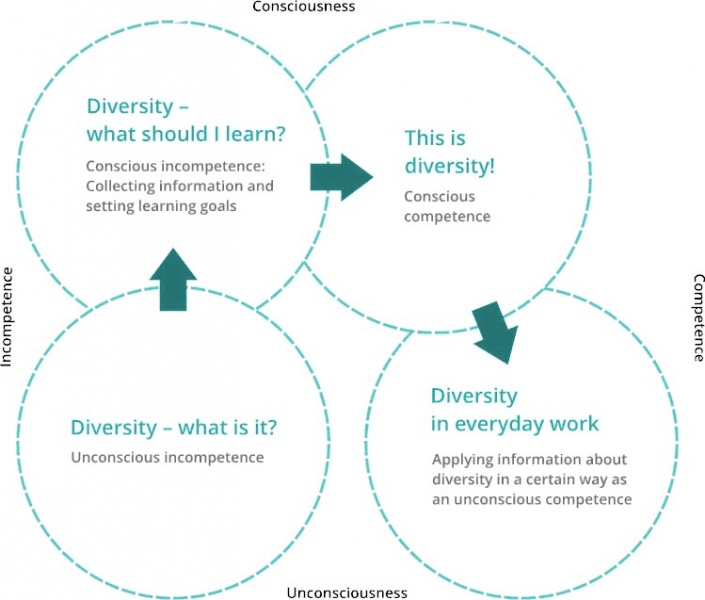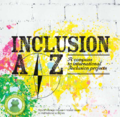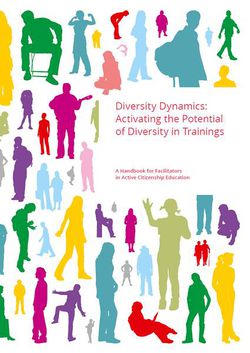In our daily life and work, we all face the scarcity of these conditions. We work against structural discrimination and under-representation of marginalized groups. We foster those who have not yet developed the capacities to become involved. Many of these problems are strongly connected to habit and education – which means we have the ability to change them.
Contents
A Question of Attitude, Not of Methods
We believe that a diversity-promoting method by itself, without a diversity-oriented attitude on the part of the facilitator, will not be successful. Gaining diversity consciousness is a little bit like learning how to drive a car or applying any other new tool. But diversity is also a little more challenging since it involves our values and our personalities. Diversity is connected to personal fears and uncertainty – people can feel threatened and negate the need for diversity. On the other hand, if you know how to drive the car, you can discover exciting new worlds you never dreamed of.
The process dimension of diversity consciousness
1. Unconscious Incompetence
The first level is unconscious incompetence. In this category, we don’t know anything about the concept of diversity, we don’t see its relevance, and we have many blind spots in our attitudes towards diversity.
2. Conscious Incompetence
By starting to address the topic and read about it, read about it, we reach the level of conscious incompetence. In this stage we follow Socrates’ example and “know that we do not know.” We start to think, to reflect, and to develop learning goals in the area of diversity.
3. Conscious Competence
The next level is reached by training, by discussion, and by “daily work”: conscious competence. We have attended trainings, applied tools, and developed attitudes in the seminar already, we have deep discussions with a range of participants and are starting to increase our sense of empathy and to become an advocate for this specific topic. On this level we have to concentrate on applying all the things we have learned.
4. Unconscious Competence
The fourth level is unconscious competence. We forget about all our conscious efforts and we simply know how to apply diversity in the training context and how to put our attitudes into practice. But sometimes we still have problems in teaching others how to deal with diversity: we need explicit knowledge to gain awareness and be able to train others. And that is why some people who reach this level are still not able to teach diversity without making additional efforts.
Inspiring Handbooks and Sources from the Community
Diversity in Youth Exchange Checklist
from German-Polish Youth Exchange
DownloadMy ID Training Background Reader
Of the project My ID (My Identity, My Idea to be Myself) on sexual orientation and gender identity (in schools)
DownloadDIVE-IN
A guidebook of guidebooks for facilitators in Diversity & Inclusion pedagogies
DownloadStories that move
Free online tool for teaching about diversity and discrimination
WebsiteTrainer Manual: Mainstreaming Gender into Peacebuilding Trainings
Dr. Cordula Reimann, CORE
DownloadResource Mobilization Toolkit
FRIDA's toolkit (not only) for girls, young women and trans youth
DownloadToolkit Social Inclusion
Toolkit 8 of Council of Europe
DownloadIdeas, resources, methods and activities for non-formal intercultural education
DownloadDiversity Dynamics: Activating the Potential of Diversity in Trainings
Heike Fahrun, Eliza Skowron, Nils-Eyk Zimmermann, MitOst
Handbook for Facilitators
DownloadGender Matters
A manual on addressing gender-based violence affecting young people
DownloadBuilding Trust in Diverse Teams
A concise facilitation handbook by OXFAM
DownloadInclusion A-Z
How to manage inclusion in international projects
DownloadUnderstanding You(th)
Exploring Identity and its Role in International Youth Work
DownloadDiversity Style Guide
By R. Kanigel/Journalism Department at San Francisco State University
OnlineInnovation Diversity - New approaches of Cultural Encounter in Europe
Un-Label's handbook on inclusive art practices
DownloadDiversity Toolkit
to University of Southern California's Guide to Discussing Identity, Power and Privilege
Website
Eliza Skowron
Co-founder Working Between Cultures, born in Poland, studies at Jagielloian UniversityKraków (Polen). Facilitator and expert for constructive communication, Anti-Bias, train-the-trainer, author in Competendo.





















